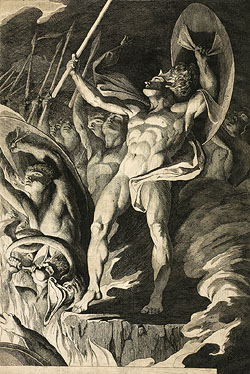

EN210B: Special Topics: English Epic
Spring Semester 2012
Tuesday and Friday 12:30-1:45
Click here for the course syllabus.
DESCRIPTION
In this course we will analyze and discuss large-scale, verse narratives created as, or received as, English national epics, or composed in or in reaction to the epic tradition. Texts will represent the major earlier time periods of English literary history: Beowulf from the Old English period; Sir Gawain and the Green Knight from the Middle English period; excerpts from Spenser’s Faerie Queene from the Elizabethan period; Milton’s Paradise Lost from the seventeenth century; Pope’s Rape of the Lock from the eighteenth century. Critical attention will be paid throughout to changing and competing conceptions of England, nation, and epic.
LEARNING OBJECTIVES
Among the educational goals for this course are that students:
REQUIREMENTS
The most important requirement for the course is that students carefully read the texts assigned for each class and attend class prepared to discuss them. For most class meetings, students will write a response paper, about a page in length, on the assigned readings. These are not graded, but are required. Responses papers are intended both to give more practice in writing and to facilitate class discussion, so late response papers cannot be accepted. Students will collect their response papers in a folder throughout the semester. At the end of the course, students will review their portfolio of response papers and submit them along with a summative essay analyzing how their views of the materials and topics have evolved over the course of the semester.
There will be two essays, approximately 6-7 pages long, due during the semester. There will also be a mid-term exam and a final exam; the format of the exams will be described as the times approach.
FORMAT OF ESSAYS
All submitted papers should follow the Modern Language Association (MLA) guidelines for formatting a paper. These guidelines can be found in the MLA Handbook for Writers of Research Papers, 6th ed., which is available in the Reference Section of the library and in the Writing Center. They are also summarized on pp. 121-162 of Hacker & Sommers’s Pocket Style Manual, with sample pages on pp. 151-154. When commenting on your essays, I will refer to Hacker on matters of format and style.
GRADING
Papers are due at the beginning of class on the day indicated on the syllabus. Unless I have explicitly granted an extension before the due date, late papers will be penalized one-third of a letter grade per day. (A paper that would have earned a B+ will receive a B if it is one day late, a B- if it is two days late, and so on.)
After essays are submitted, I will read them and return them with grades and with comments and suggestions. Students will then have one week from the day the graded papers are returned to revise the papers in light of my comments and to resubmit them for re-grading. The grade may be improved by as much as a full letter grade. The grade may not go up at all, but it will not go down. This is to encourage you to think of every essay as a work in progress and to revise your work as thoroughly and as frequently as possible. As you write and revise your essays, please keep in mind that there are peer-tutors in the Writing Center trained to help students of any level develop work at any stage.
Final grades for the semester will be calculated according to the following formula:
ACADEMIC HONESTY
No secondary critical sources are required for the essays and written assignments assigned in this course, and in general I would prefer that you not use any. I am most interested in your own analysis of and response to the literature we read, as well as the thesis you are develop and defend.
You are, of course, always free to consult other sources. But any source that you use in writing an essay must be fully cited. The source must appear in the list of works cited at the end of the essay, and each source must be cited on every occasion that you make use of its words or ideas. This is true if the source is your primary source (the poem you are studying) or a critical source (an analysis of the work published elsewhere), and it is true if the source is printed or electronic, including internet sources. Follow the MLA style of in-text citation and lists of works cited described in A Pocket Style Manual, pp. 121-162.
The failure to fully cite sources within your submitted work is a form of plagiarism. Plagiarism is the appropriation of ideas, data, work, or language of others and submitting them as one’s own to satisfy the requirements of a course. Plagiarism constitutes theft and deceit. Special care should be taken, when cutting and pasting materials or when paraphrasing, to cite sources correctly and to use quotation marks around exact words from source materials. Actions that result in plagiarism may be intentional or unintentional. Consequently, students must understand the concept of plagiarism. When reading, processing, or using materials from any source, appropriate documentation is always essential.
Resources such as the library (ext. 2178) and the Writing Center (www.fairfield.edu/writingcenter) are available on campus to assist you in your academic endeavors. You are encouraged to take advantage of these resources.
TEXTS
The required texts for the class are: